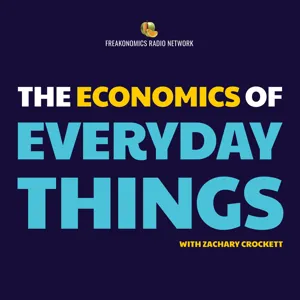Podcast Summary
From niche to major crop: The pistachio success story: Market dynamics and geopolitical events can significantly impact agricultural industries, leading to the rise of once obscure crops like pistachios in the US
Pistachios, once a niche and hard-to-crack nut with limited commercial appeal in the United States, have become a major agricultural success story. Growing up, Sawyer Clark, like many others, didn't understand the allure of pistachios. But the nut's fortunes have changed dramatically. Pistachios have been cultivated for over a thousand years in other parts of the world, but their commercial production in the US began in the late 19th century. However, the US market was dominated by imports from Iran until the 1970s when Iran started prioritizing domestic consumption. This created an opportunity for US farmers to grow their own pistachios commercially. Today, pistachios are a major crop in the US, with production growing from £250 million in the 1990s to an estimated £1.5 billion this year. The nut is now a staple in American grocery stores and even featured in Super Bowl ads. This transformation is a great example of how market dynamics and geopolitical events can impact agricultural industries.
Iranian Revolution Opens Door for California Pistachio Production: California's Mediterranean climate, suitable soils, and extensive water infrastructure make it a global leader in pistachio production. Starting a pistachio orchard is costly and takes a decade to break even, but the long-term returns are lucrative.
The Iranian revolution in 1980 led to an opportunity for California to become a global leader in pistachio production. Immigrants from countries with similar climates and soils, such as Iran and Turkey, brought their knowledge and experience to the Central Valley and started growing pistachios. Today, the US harvests nearly £900,000,000 of pistachios annually, with California's Central Valley producing almost all of it. To grow pistachios, a Mediterranean climate, suitable soils, and access to water are necessary. California's extensive water infrastructure helps deliver water during the summer. Gold Leaf Farming, one of only 950 pistachio producers in the US, grows 12,000 acres of pistachios, almonds, and dates, with an average yield of £3,000 an acre. Starting a pistachio orchard is costly, with £20,000 an acre for the land, £5,000 an acre to plant it, and £10,000 per acre to grow and farm the trees. It takes 5 years for the trees to produce anything, and even then, yields are low. It takes nearly a decade for an orchard to break even. Despite the initial investment and long wait for returns, pistachios have become a lucrative business.
Pistachio farming: A delicate process with a narrow window for success: During the brief harvest period, farmers must carefully time tree shaking to ensure optimal nut yield, removing the outer layer before consumers can eat the shell.
Farming, specifically pistachio farming, is a delicate and complex process with a narrow window for success. Farmers invest significant time and resources into their crops, which can live for decades, with only a brief harvest period each year. During this period, farmers must carefully time the shaking of trees to ensure optimal nut yield, as shaking too early or too late can negatively impact the harvest. The goal is to have mostly open shell nuts, with only a small percentage sealed or cracked. This is crucial because what farmers see on the tree is not what consumers get - the nut still has an outer layer called the hole, which must be removed before the shell is consumed. This layer contains moisture and can pose challenges in the harvesting process. The success of the entire year's work hinges on this critical period, making it a stressful and intense time for farmers.
Pistachio Industry's Growth and Dominant Player: The pistachio industry is expanding due to new farmers and investment, with Wonderful leading the market as a dominant force controlling the entire supply chain, generating over $1 billion in sales.
The pistachio industry is experiencing a significant increase in supply due to an influx of new farmers and investment in market growth. Processors, like Wonderful, are responding by increasing marketing efforts to ensure consumer demand keeps pace. Wonderful, a major player in the industry, controls the entire pistachio supply chain from farming to processing and marketing, making it the dominant force in the market. The company, which also produces other commodities like halo mandarins, Fiji water, and pomegranate drink, made over $1 billion in retail sales in 2020. Growers, like Sawyer Clark, sell their nuts to companies like Wonderful, which pays them by the pound including the heavy shells. Despite the challenges of a saturated market and low prices for growers in recent years, the pistachio industry continues to grow and evolve.
Wonderful's game-changing advertising campaigns boosted pistachio demand: Wonderful's $55 million investment in advertising led to a significant increase in US per capita pistachio consumption from 0.1 lb to nearly 0.5 lb per year through celebrity endorsements, Super Bowl ads, and CGI commercials.
Wonderful, a leading pistachio processor, revolutionized the market by boosting demand through strategic advertising campaigns. With pistachio production on the rise, Wonderful invested $55 million in advertising in the late 2000s. Before this, pistachios were not commonly sold in packages and consumption was low. The company's "Get Crackin'" campaign featured celebrities and characters eating pistachios in national TV spots, reaching millions of households through Super Bowl ads and CGI elephant commercials. These campaigns significantly increased per capita pistachio consumption in the US from 1 tenth of a pound per year to nearly half a pound per year. Today, Wonderful continues to target younger generations through esports content and TikTok influencers. However, the growth of the pistachio industry faces a challenge due to the high water requirements for nut production.
Pistachio Farming's Water Usage Controversy: Pistachio farming uses large amounts of water, but industry leaders claim to be responsible water users through precision irrigation and recyclability, while working to increase demand to match incoming supply.
Pistachio farming requires a significant amount of water, with one acre requiring approximately 900,000 gallons per year. This water usage is a contentious issue, especially in drought-stricken areas like California. Despite this, the pistachio industry is projected to nearly double in supply within the next decade. The company, Wonderful, which owns a large stake in one of California's largest aquifers, uses over 150 billion gallons of water annually. However, they claim to be responsible water users, employing precision irrigation and focusing on recyclability. The water crisis is expected to worsen, but the pistachio industry shows no signs of slowing down. The industry's largest trade group, American Pistachio Growers, is working to find new markets and increase demand to match the incoming supply. Despite these challenges, some farmers, like Sawyer Clark, remain optimistic about the future of pistachio farming. However, the potential impact of extreme weather events, such as hurricanes, on the industry remains a mystery.






